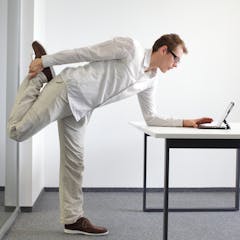
Articles on Sitting
Displaying 1 - 20 of 34 articles

We really ought to be sitting less. Seriously.

Sedentary lifestyles come with substantial health risks. But even small increases in our daily physical activity may go some way to mitigating these risks.

The recent survey confirmed what many people think – men prefer to stand when peeing. But is that the best way?

The science behind why crossing your legs while sitting could be detrimental to your health.

Short, frequent walks throughout the day are key to helping prevent the harmful effects of a sedentary lifestyle.

Sometimes, it’s best to take your medicine sitting up. Other times, lying down is safer. Here’s what we know so far.

What if assisted living facilities became more active communities, where the residents were less sedentary? This could potentially enable residents to gain more independence, rather than losing it.

Choosing the right “cocktail” of light activity, exercise and sitting, can improve health and decrease risk of premature death.

Even just a few minutes of walking every hour can help better manage blood sugar levels.

Too much time sitting is linked to health risks, and also to lower quality of life. But in some contexts, such as reading, playing an instrument or socializing, sitting had positive associations.

If you believe the memes, men spend ages in the toilet. But they’re not always pooing. Here’s what they’re really doing.

Couch potatoes are always looking for a way out.

Sitting on the floor is still common in many cultures – but is it better for your health?

Even if you exercise, sitting too much is linked to health risks from anxiety to diabetes. But this ‘invisible’ behaviour may pervade our lives even more under COVID-19 stay-at-home guidelines.

It may not be such a bad habit after all.

Getting enough exercise to offset the health impacts of sitting might be easier than you think, new research shows.

Sitting has been maligned in recent years for its role in obesity and diabetes. Now, a recent study in older women suggests that sedentary behavior may also increase heart disease risk.

The transition from primary to secondary school can be tough for children socially and emotionally. Students also do less physical activity in secondary school, and need help with this transition too.

Sitting too much might be killing you – this is what you can do about it.

If you sit all day at work, then cancer, diabetes, heart disease and death are the likely outcomes. A cardiologist explains how the simple act of counting can reverse this evolutionary trend.
